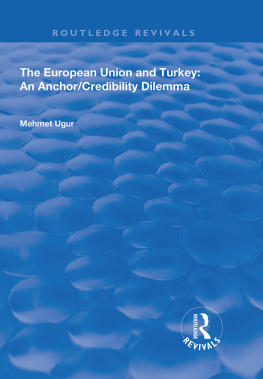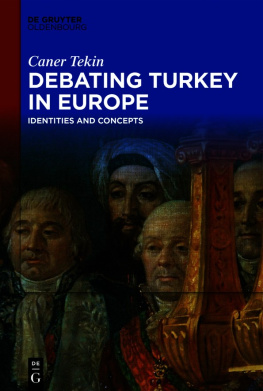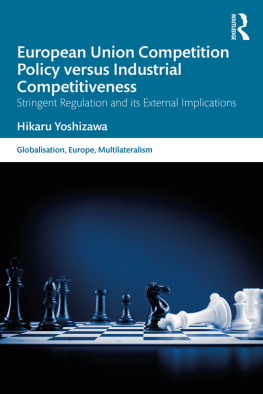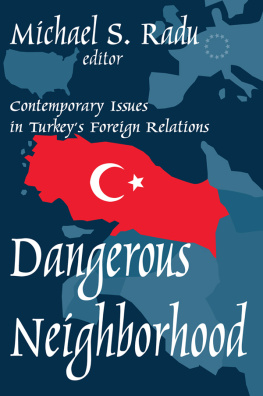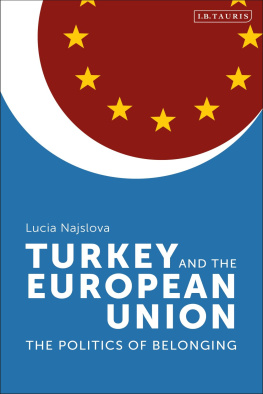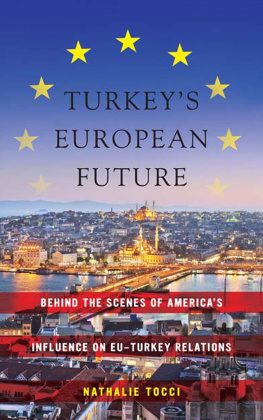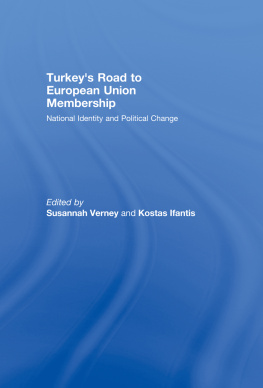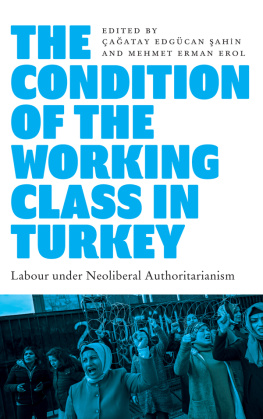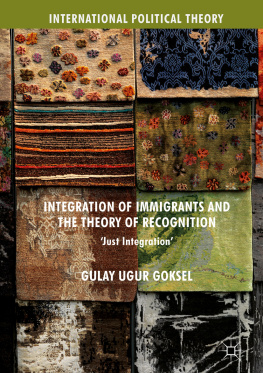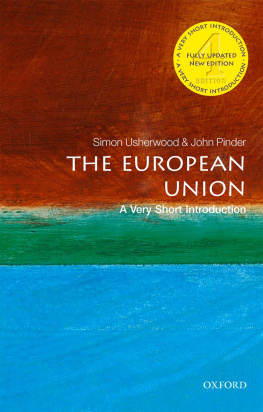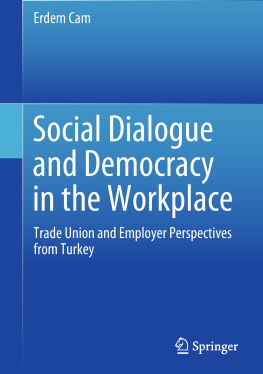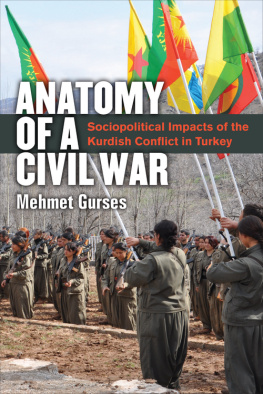To Sema. Deniz and Sha
First published 1999 by Ashgate Publishing
Reissued 2018 by Routledge
2 Park Square, Milton Park, Abingdon, Oxon, 0X14 4RN
52 Vanderbilt Avenue, New York, NY 10017
Routledge is an imprint of the Taylor & Francis Group, an informa business
Copyright Mehmet Ugur 1999
All rights reserved. No part of this book may be reprinted or reproduced or utilised in any form or by any electronic, mechanical, or other means, now known or hereafter invented, including photocopying and recording, or in any information storage or retrieval system, without permission in writing from the publishers.
Notice:
Product or corporate names may be trademarks or registered trademarks, and are used only for identification and explanation without intent to infringe.
Publishers Note:
The publisher has gone to great lengths to ensure the quality of this reprint but points out that some imperfections in the original copies may be apparent.
Disclaimer
The publisher has made every effort to trace copyright holders and welcomes correspondence from those they have been unable to contact.
A Library of Congress record exists under LC control number: 99072362
ISBN 13: 978-1-138-35874-4 (hbk)
ISBN 13: 978-0-429-43417-4 (ebk)
This book is the result of my work on the European Unions external policymaking and its relations with Turkey. In that work, I used state-society interaction within the member states as an analytical framework for identifying the variables likely to impinge on: (i) the dynamics of European integration; (ii) the nature of EU policy-making procedures; and (iii) the EUs capacity to take decisions which go beyond the lowest common denominator. I conceptualised these variables as societal assertiveness and issue transparency/divisibility. While the former depicts the extent to which societal groups try to influence policy decisions by shifting loyalties to other jurisdictions and/or lobbying, the latter captures the extent to which implications of policy decisions are quantifiable and affect different societal groups differently. Work on these issues led to the completion of a Ph.D. thesis, which examined EU-Turkey relations with a view to test the hypothesis that different combinations of societal assertiveness and transparency/divisibility at the national level generate different degrees of integration and different mixtures of supranational and intergovernmental procedures at the EU level.
Meanwhile, my reading of the evidence on EU-Turkey relations prompted me to think about a new question: why did EU-Turkey relations tend to be characterised by recurrent crises which, ironically, emerged after significant steps forward in upgrading the contractual arrangements between the two parties? The first crisis emerged in 1960, when a military coup followed the signing of the Association Agreement and indicated the vulnerability of Turkeys democratic institutions. The second crisis occurred in 1970, when Turkey realised that the trade liberalisation envisaged in the Additional Protocol signed in 1970 was incompatible with the requirements of the import-substitution policy which had been in place since 1963. Then, throughout the 1970s, a number of crises recurred around issues including the extent of unilateral preferential treatment to be granted to Turkish agricultural products, the flexibility with which Turkey should implement the AP, and the gradual introduction of the free movement of workers. In 1980, Turkey tried to break the deadlock in her relations with the EU by accelerating the preparations for a membership application. This policy change proved a premature step and was followed by the military coup of 12 The European Union and Turkey An Anchor/Credibility Dilemma September 1980.
Following the interregnum caused by the military coup, Turkey placed a membership application in 1987 The membership bid was followed not only by a panic in the EU but also by Turkeys failure to embark on a credible process of convergence towards European standards, leading to the rejection of the membership application in 1989. Finally, the customs union agreement of December 1995 was followed by the decision of the Luxembourg Summit of December 1997 not to include Turkey in the list of candidates for membership. Turkeys response was to freeze relations with the EU, including the implementation of the customs union agreement. Although the Cardiff Summit of June 1998 signalled a change in the EUs position and Turkey was eventually classified as a candidate in November 1998, uncertainty continued to prevail as Turkish policy-makers continued to reflect their inability to tackle three major issues: persistent violations of human rights, including the treatment of the Kurdish population; the civilian governments control over the military; and the resolution of the Cyprus problem as well as other issues in Greco-Turkish relations.
Given these regularities, the question above led to a secondary question: can recurrent crises in EU-Turkey relations be explained within a single analytical framework allowing for a simultaneous analysis of both EU and Turkish policy decisions? The search for an answer suggested that state-society interaction can be a useful framework for two reasons. First, it can be used to identify, at a given time, the level of the societal assertiveness and issue transparency/divisibility not only in the EU but also in Turkey. Second, it allows for incorporating the effect of past EU and Turkish policy decisions on societal expectations which, in turn, influence societal assertiveness and issue transparency/divisibility. In fact, the second reason suggests that there is scope for taking a step forward from my earlier work on EU policy-making and EU-Turkey relations by incorporating expectation formation into the analysis.
Taking these properties into account, this book argues that recurrent crises in EU-Turkey relations are endogenous outcomes of an anchor/credibility dilemma, which reflects two tendencies working at cross purposes. On the one hand, state-society interaction in EU member states limits the EUs capacity to undertake commitments and/or impose sanctions with a view to anchor Turkeys convergence towards European standards. On the other hand, the type of state-society interaction in Turkey induces Turkish policy-makers to engage in frequent deviations from the policy reform required for convergence. The combination of both tendencies leads to a typical prisoners dilemma where the EUs failure to act as an effective anchor increases the probability of policy reversals in Turkey which, in turn, induces the EU to be even more reluctant about anchoring Turkeys convergence towards European standards. What I add to this standard strategic interaction analysis is that the anchor/credibility dilemma in EU-Turkey relations is exacerbated by the impact of the sub-optimal policy decisions on societal expectations in the EU and Turkey. In other words, the level of societal assertiveness and issue transparency/divisibility which may initiate the anchor/credibility dilemma are not constant. They may also be influenced by past policy decisions, which may or may not be conducive to ameliorating the anchor/credibility dilemma.
Because of this endogenous dynamic, the anchor/credibility dilemma continued to haunt EU-Turkey relations since the early 1970s despite repeated declarations confirming both parties commitment to the original goals of integration and convergence. For example, both sides interpreted the Association Agreement as a step that confirmed Turkeys European vocation and her importance for the free world. Similarly, the membership application of 1987 was presented not only as the ultimate proof of Turkeys commitment to European values, but also as a step that would eliminate any ambiguity about that commitment by anchoring the destiny of Turkish people to that of Western Europe. Finally, the establishment of a customs union was described as a development that would anchor Turkey firmly in Europe and contribute to her economic modernisation. Underlying these declarations was the assumption that Turkeys link with Europe was not only a natural result of the countrys modernisation but also a necessary condition that would reduce the probability of deviations from that trajectory in the face of internal as well as regional challenges. This assumption was held so strongly that it survived the collapse of the Soviet bloc and was upgraded to portray Turkey as a secular and democratic role model not only for her neighbours but also for the newly independent countries of the Central Asia.


